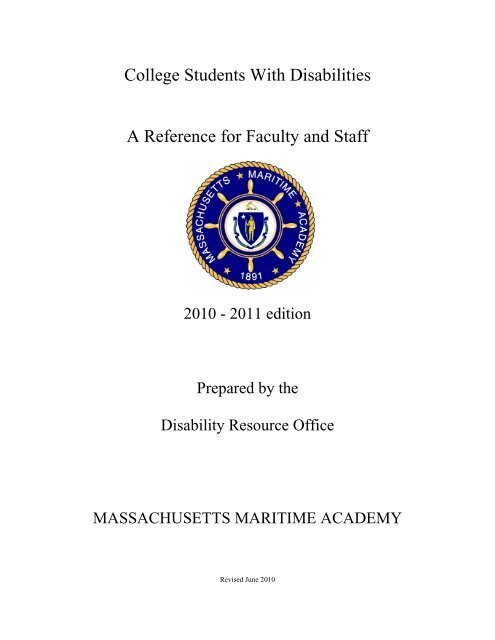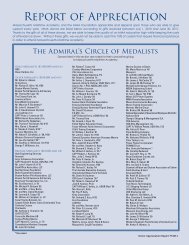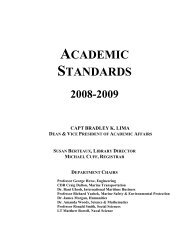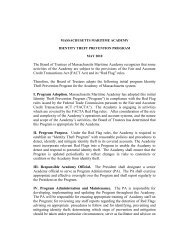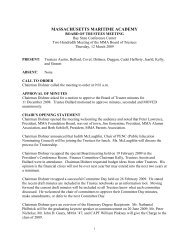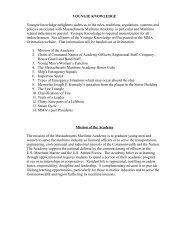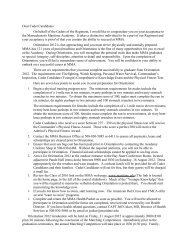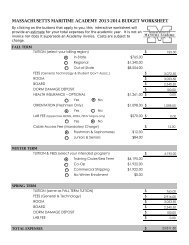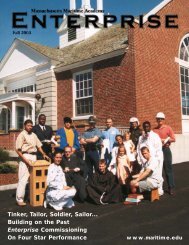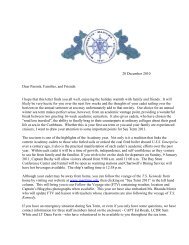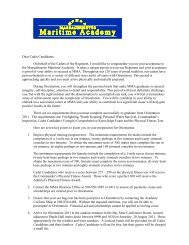College Students With Disabilities - Massachusetts Maritime Academy
College Students With Disabilities - Massachusetts Maritime Academy
College Students With Disabilities - Massachusetts Maritime Academy
Create successful ePaper yourself
Turn your PDF publications into a flip-book with our unique Google optimized e-Paper software.
<strong>College</strong> <strong>Students</strong> <strong>With</strong> <strong>Disabilities</strong><br />
A Reference for Faculty and Staff<br />
2010 - 2011 edition<br />
Prepared by the<br />
Disability Resource Office<br />
MASSACHUSETTS MARITIME ACADEMY<br />
Revised June 2010
Adapted for <strong>Massachusetts</strong> <strong>Maritime</strong> <strong>Academy</strong><br />
By<br />
Dr. F. M. Tishkevich<br />
Selected Resources Consulted in Preparation of this Guide<br />
Americans with <strong>Disabilities</strong> Act<br />
Title II<br />
Section 504<br />
Americans with <strong>Disabilities</strong> Act Amendments Act<br />
Bridgewater State <strong>College</strong><br />
Disability and Higher Education: Guidance for Section 504 and ADA Compliance<br />
Disability Compliance for Higher Education, 2007 Handbook<br />
Disability Compliance for Higher Education, 2008 Handbook<br />
FERPA<br />
Mass <strong>College</strong> of Liberal Arts<br />
Testing Accommodations in Higher Education: Complying with the ADA and Section 504<br />
The Disability Services Office Manual: Model Forms, Policies and Procedures<br />
UMass Dartmouth<br />
United States Department of Justice<br />
United States Department of Education<br />
<strong>Students</strong> with <strong>Disabilities</strong>: Preparing for Post-Secondary Education<br />
2
Table of Contents<br />
Introduction . . . . . . . . . . . . . . . . . . . . . . . . . . . . . . . . . . . . . . . . . . . . . . . . . 5<br />
The Law . . . . . . . . . . . . . . . . . . . . . . . . . . . . . . . . . . . . . . . . . . . . . . . . . 6<br />
The Americans with <strong>Disabilities</strong> Act . . . . . . . . . . . . . . . . . . . . . . . . . . . . . . . . . 6<br />
Section 504 . . . . . . . . . . . . . . . . . . . . . . . . . . . . . . . . . . . . . . . . . . . . . . 6<br />
The Americans with <strong>Disabilities</strong> Act Amendments Act . . . . . . . . . . . . . . . . . . . . . . . . 6<br />
Disability Compliance Office . . . . . . . . . . . . . . . . . . . . . . . . . . . . . . . . . . . . . . . 8<br />
Philosophy . . . . . . . . . . . . . . . . . . . . . . . . . . . . . . . . . . . . . . . . . . . . . . . 8<br />
Policies and Procedures . . . . . . . . . . . . . . . . . . . . . . . . . . . . . . . . . . . . . . . . . 8<br />
Documentation Requirements . . . . . . . . . . . . . . . . . . . . . . . . . . . . . . . . . . . . . 11<br />
Information Release Authorization Form . . . . . . . . . . . . . . . . . . . . . . . . . . . . . 13<br />
Grievance Procedure . . . . . . . . . . . . . . . . . . . . . . . . . . . . . . . . . . . . . . . . . 14<br />
Faculty Accommodation Denial – Legal Counsel Resolution . . . . . . . . . . . . . . . . . . . 15<br />
Formal Complaint Procedures . . . . . . . . . . . . . . . . . . . . . . . . . . . . . . . . . . . 16<br />
Rights and Responsibilities . . . . . . . . . . . . . . . . . . . . . . . . . . . . . . . . . . . . . . . . . 17<br />
Faculty . . . . . . . . . . . . . . . . . . . . . . . . . . . . . . . . . . . . . . . . . . . . . . . . . 17<br />
<strong>Students</strong> . . . . . . . . . . . . . . . . . . . . . . . . . . . . . . . . . . . . . . . . . . . . . . . . . 18<br />
Accommodation Differences: K-12 vs. <strong>College</strong> . . . . . . . . . . . . . . . . . . . . . . . . . . . . .19<br />
Recent Legal Decision . . . . . . . . . . . . . . . . . . . . . . . . . . . . . . . . . . . . . . . . . 21<br />
Confidentiality . . . . . . . . . . . . . . . . . . . . . . . . . . . . . . . . . . . . . . . . . . . . . . . 22<br />
Family Educational Rights and Privacy Act . . . . . . . . . . . . . . . . . . . . . . . . . . . . . . 22<br />
FERPA Release Form . . . . . . . . . . . . . . . . . . . . . . . . . . . . . . . . . . . . . . . . 24<br />
Testing . . . . . . . . . . . . . . . . . . . . . . . . . . . . . . . . . . . . . . . . . . . . . . . . . . . 25<br />
Testing . . . . . . . . . . . . . . . . . . . . . . . . . . . . . . . . . . . . . . . . . . . . . . . . . . 25<br />
Recent Legal Decisions . . . . . . . . . . . . . . . . . . . . . . . . . . . . . . . . . . . . . . . . . 25<br />
3
Other <strong>Disabilities</strong> . . . . . . . . . . . . . . . . . . . . . . . . . . . . . . . . . . . . . . . . . . . . . . 27<br />
Section 504 of the Rehabilitation Act of 1973 . . . . . . . . . . . . . . . . . . . . . . . . . . . . . 27<br />
Under the Americans with <strong>Disabilities</strong> Act. . . . . . . . . . . . . . . . . . . . . . . . . . . . . . . 28<br />
4
Introduction<br />
This guide is designed to serve as a quick reference for information, accommodations and legal requirements in<br />
providing equal access for students with disabilities.<br />
The mandate to provide reasonable accommodations for students with disabilities comes from federal law and<br />
from the mission of the college to provide an educational opportunity to all its students. <strong>Massachusetts</strong><br />
<strong>Maritime</strong> <strong>Academy</strong> is committed to providing campus and academic accessibility for all qualified students.<br />
Appropriate academic adjustments must be determined based on a student’s disability and individual needs.<br />
However, the college is not required to provide any academic adjustments that would lower academic standards,<br />
fundamentally alter the nature of the program, or impose an undue burden on the college.<br />
Note: The Disability Compliance Officer (DCO) does not determine what accommodations the student is<br />
entitled to under the Americans with <strong>Disabilities</strong> Act and Section 504 of the Rehabilitation Act of 1973. Rather,<br />
the DCO reviews documentation submitted by the student. This documentation, provided by an outside<br />
evaluator, includes the credentials of the evaluator, a diagnostic statement identifying the disability, a<br />
description of the diagnostic methodology used, a description of the current functional limitations, a description<br />
of the expected progression or stability of the disability, a description of current and past accommodations,<br />
services and/or medications, and finally, recommendations for accommodations. It is by reviewing this<br />
documentation that the DCO determines the accommodations to which the student is entitled.<br />
When a professor sees a student struggling academically and suspects a disability, the natural instinct may be to<br />
provide an accommodation without consulting the DCO. This could put the institution at legal risk and put<br />
other students at a disadvantage.<br />
Please read through this guide and direct questions about disability compliance to the DCO so that<br />
accommodation needs are met in a fair and consistent manner.<br />
Throughout this document, Disability Compliance Office (DCO) and Disability Resource Office (DRO) are<br />
used interchangeably.<br />
5
The Law<br />
American with <strong>Disabilities</strong> Act<br />
The ADA prohibits discrimination on the basis of disability in employment, State and local government, public<br />
accommodations, commercial facilities, transportation and telecommunications.<br />
To be protected by the ADA, one must have a disability or have a relationship or association with an individual<br />
with a disability. An individual with a disability is defined by the ADA as a person who has a physical or<br />
mental impairment that substantially limits one of ore major life activities, a person who has a history or record<br />
of such an impairment, or a person who is perceived by others as having such an impairment. The ADA does<br />
not specifically name all of the impairments that are covered.<br />
Americans with <strong>Disabilities</strong> Act: Title II<br />
Subject to the provisions of this subchapter, no qualified individual with a disability shall, by reason of such<br />
disability, be excluded from participation in or be denied the benefits of the services, programs, or activities of a<br />
public entity, or be subjected to discrimination by any such entity.<br />
Rehabilitation Act of 1973: Section 504<br />
No otherwise qualified individual with a disability in the United States shall, solely by reason of her or his<br />
disability, be excluded from the participation in, be denied the benefits of, or be subjected to discrimination<br />
under any program or activity receiving Federal financial assistance. For the purposes of this section, the term<br />
"program or activity" means all of the operations of - (2)(A) a college, university, or other post-secondary<br />
institution, or a public system of higher education.<br />
Americans with <strong>Disabilities</strong> Act: Amendments Act<br />
The ADA Amendments Act of 2008 (Public Law 110-325, ADAAA) became effective January 1, 2009. The<br />
ADAAA expands interpretation of the ADA's coverage, which has been narrowly construed by case law in a<br />
number of decisions by the Supreme Court. Because Congress viewed those decisions as limiting the rights of<br />
persons with disabilities, the ADAAA explicitly reversed those decisions. It also rejected portions of the<br />
regulations published by the Equal Employment Opportunity Commission (EEOC) that interpret Title I (the<br />
employment-related title) of the ADA. The ADAAA makes changes to the definition of the term "disability,"<br />
clarifying and broadening that definition -- and therefore the number and types of persons who are protected<br />
under the ADA and other Federal disability nondiscrimination laws.<br />
The ADAAA requires that courts interpreting the ADA focus on whether the covered entity has discriminated,<br />
rather than whether the individual seeking the law's protection has an impairment that fits within the technical<br />
definition of the term "disability." The Act retains the ADA's basic definition of "disability" as: 1. an<br />
impairment that substantially limits one or more major life activities; 2. a record of such an impairment; or 3.<br />
being regarded as having such an impairment. However, it changes the way that the statutory terms should be<br />
interpreted.<br />
6
The ADAAA renews Congress’ commitment to ensuring that all Americans with disabilities are able to<br />
participate to the fullest possible extent in all facets of society. By broadening the definition of disability in the<br />
ADA, the ADAAA provides protection for persons previously excluded by Supreme Court cases. Future cases<br />
under the ADA will focus less on the threshold question of whether a person is disabled, and will focus more on<br />
whether discrimination occurred, including whether an accommodation or modification was unjustly denied.<br />
7
Disability Compliance Office<br />
Philosophy<br />
Documented students should take full advantage of the accommodations to which they are entitled during the<br />
first college year and also into the second year. During the third and final years at MMA, the DCO encourages<br />
a gradual weaning from reliance on accommodations for two reasons: 1. depending upon a selected major, a<br />
Coast Guard licensing examination will be required in the senior year. As the Coast Guard does not allow<br />
accommodations for this exam, a student will be better prepared to pass the exam if (s)he has been weaned from<br />
accommodations in the year or two preceding; 2. whether a selected major has a licensing exam or not,<br />
accommodations for learning disabilities are not a reality in certain professions. The DCO policy is to<br />
encourage a gradual weaning from accommodations as skill and confidence in a particular discipline increases<br />
in order to better prepare a student for employment in the Merchant Marine and to better prepare a student for<br />
life in general. MMA’s strong academic support programs can help this transition.<br />
Policies and Procedures<br />
<strong>Massachusetts</strong> <strong>Maritime</strong> <strong>Academy</strong> is committed to providing reasonable accommodations for students with<br />
documented disabilities. The DCO works in collaboration with the faculty and other campus departments to<br />
provide support for students with disabilities. This coordination of efforts complies with the mandates of<br />
Section 504 of the Rehabilitation Act of 1973 and the Americans with <strong>Disabilities</strong> Act of 1990.<br />
At the post-secondary school level, a student must disclose his learning differences in order to receive<br />
reasonable academic accommodations. The Voluntary Disclosure of Disability Form (Form 101) is available in<br />
the Disability Compliance Office or for ready download on the MMA website.<br />
Once the disclosure form is completed, a student must submit documentation from a qualified professional<br />
stating the nature of the disability and its impact on the student’s learning in the college environment. This<br />
evaluation documentation must be completed within three years of enrollment to <strong>Massachusetts</strong> <strong>Maritime</strong><br />
<strong>Academy</strong>. An Individualized Education Plan (I.E.P.) without underlying assessment documentation is not<br />
acceptable. The specific documentation criteria required is also available for download on the MMA website.<br />
Once documentation is received and reviewed by the DCO, a support services plan is developed with the<br />
student. Depending upon the nature of the disability, students may be eligible for one or more of the following<br />
accommodations:<br />
• Extended time for quizzes and tests (not to exceed time and one half)<br />
• Preferential seating<br />
• Reduced distraction room for testing<br />
• Priority registration<br />
• Note taker<br />
• Word processor use<br />
• Use of tape recorder for lectures<br />
• Textbooks on tape<br />
Reasonable accommodations will be arranged for a student provided the accommodation does not substantially<br />
alter the fundamental nature of the academic class or program.<br />
8
Intake Meeting<br />
After a student has been admitted to MMA and the proper documentation has been submitted, an intake meeting<br />
with the student and the DCO will be arranged. Preferably this will occur during the late spring or early<br />
summer before enrollment at MMA. Arrangements for an intake meeting with students who travel a great<br />
distance will be made during orientation. An intake meeting will consider the learning styles of the student and<br />
a mutual agreement plan will be developed as to how best to accommodate those differences during the<br />
academic year.<br />
Forms Process<br />
During the first two weeks of class, a student should visit the DCO to pick up the green Faculty Agreement<br />
Accommodation forms (Form 105) that will require signatures by the student’s professors. The forms contain a<br />
menu of accommodations. The specific accommodation needed by the named student will be indicated by a<br />
bold X next to it along with an asterisk for any additional comments or suggestions (e.g. Writing Center or LRC<br />
appointments) that will help the professor support the student’s learning style. At the bottom of the form, there<br />
are spaces for signatures: the professor’s, the student’s and the DCO’s. The student should present the<br />
accommodation form to each of his/her professors. Ideally, this should be presented during a meeting in the<br />
professor’s office so that a thoughtful and private discussion on how best the professor might accommodate the<br />
student’s learning style can be addressed. If agreeable to the stated accommodation, the professor will sign the<br />
form, as will the student. Once the professor signs the agreement, (s)he should make a notation on his/her roster<br />
indicating that the named student is entitled to accommodations. Once signed, the particular accommodations<br />
will be left up to the discretion of the professor to arrange with the student.<br />
The signed form is returned by the student to the DCO where the signed copy is maintained in the files. When<br />
forms are returned, the DCO will send an e-copy of the form to the professor so that the professor can maintain<br />
an electronic file of the accommodations for each class. The professor may also elect to make a copy for his<br />
academic files. <strong>With</strong> proper documentation, students are entitled to accommodations at any point during the<br />
semester. However, for students’ academic success since accommodations are not required to be given until the<br />
professor has been notified, these procedures are strongly encouraged during the first two weeks of class.<br />
Once email verification has been sent to the professor, a student’s responsibility does not end. Because classes<br />
are so tightly scheduled and space is limited, a student must notify a professor in advance of any test or quiz for<br />
which (s)he will require a separate, reduced-distraction room. This is in order that room arrangements may be<br />
made ahead of time, if needed. For scheduled quizzes and exams, a professor should be notified one to two class<br />
periods beforehand, if possible. For a final exam, a professor should be notified a week in advance. Failure to<br />
give adequate notice to professors of the need for separate exam room accommodations may result in those<br />
accommodations not being provided.<br />
Mid-semester Accommodation<br />
Occasionally, a student may not want to disclose a known disability, expecting that (s)he will succeed without<br />
academic accommodations. When the academic workload, coupled with Regimental responsibilities, becomes<br />
overwhelming, a student at mid-semester may suddenly realize (s)he needs help. Provided that this disclosure<br />
and documentation submission is timely (timely is not considered to be the day of an exam), the same initial<br />
forms procedure is to be followed: documentation submission, intake meeting, form agreement signed by<br />
professors, and forms returned to the DCO.<br />
As the semester progresses, a previously undiagnosed student may feel that the MMA workload is unusually<br />
difficult and that (s)he may have a latent learning disability. A professor may also refer a student at midsemester<br />
to the DCO if a student’s classroom performance reveals the possibility of a learning disability. A<br />
discussion with the student and his professors to determine the extent of the academic issues will be made. If<br />
9
testing is recommended, the DCO has a list of nearby professionals available for learning disability assessment.<br />
A student may also choose to be tested elsewhere. Once an appointment is made, a student may receive Faculty<br />
Agreement Pending Testing forms (Form 106) to be given to professors. This form requests extra time on<br />
upcoming tests pending the outcome of an evaluation by a professional. This is a short, interim accommodation,<br />
is infrequently granted, and its duration is no longer than four to six weeks during a semester.<br />
Appeal Process<br />
There are times when a professor is not in agreement with a student’s accommodation. A discussion between<br />
the student and the particular professor about the reasons for denial and any suggested alternatives should take<br />
place. If the matter is resolved satisfactorily between student and professor, the DCO will have no further<br />
involvement. A professor should note in writing on Form 105 why (s)he is not agreeable to the<br />
accommodation, what alternative, if any, will be made, and the professor should have the student initial it. This<br />
written explanation is necessary and is required by the Office of Civil Rights. A signed and dated written<br />
record may protect against potential personal and institutional liability at a later date.<br />
Case law supports a professor’s denial of an accommodation if the essential nature of the academic class or<br />
program is altered by it. However, any denial or alternative adjustment must be supported with a written<br />
statement. If no explanation is given, if a student is not in agreement, or if the denial appears arbitrary and an<br />
essential nature of the class is not compromised, the DCO will mediate the accommodations issue. If that<br />
discussion cannot reach a mutual resolution, a meeting with the Academic Dean and the Department Chair will<br />
be arranged to fully vet the issue. Since arbitrary denials of accommodations can violate civil rights afforded to<br />
disabled students under the ADA and Section 504 of the Rehabilitation Act, and can predispose parties to<br />
personal and institutional liability, a final determination by MMA legal counsel (Form 107) will be made, if<br />
necessary.<br />
Employee and Student ADA Claims<br />
Employees and students who have a disability or who suffer from a temporary disability may be eligible to<br />
receive reasonable accommodations in their work and study environment at MMA. The DCO works<br />
interactively with all campus departments to ensure compliance under the Americans with <strong>Disabilities</strong> Act.<br />
Forms requesting such accommodations are available in the Disability Compliance Office and in the Human<br />
Resources Office. When a request is made to the DCO, submission of supporting medical documentation may<br />
be necessary. Depending upon the particular nature and duration of the disability, periodic medical<br />
documentation and/or an independent evaluation may be required.<br />
Division of Graduate and Continuing Education<br />
Each student enrolled in coursework at MMA has the right to reasonable accommodations according to his/her<br />
disability, regardless of the delivery system. <strong>Students</strong> enrolled through the Division of Graduate and<br />
Continuing Education follow the same procedures described above. A “Voluntary Disclosure Form” is<br />
submitted to the DCO. The student must also submit documentation from a qualified professional stating the<br />
nature of the disability and its impact on the student’s learning in the college environment. Once documentation<br />
is received and reviewed by the DCO, a support services plan is developed. An accommodation form will then<br />
be completed for the student to present to his/her instructors. <strong>Students</strong> enrolled in DGCE courses have the same<br />
rights and responsibilities as all other students at MMA.<br />
10
Documentation Requirements<br />
Disability documentation for the purpose of providing accommodations must accomplish two goals so that<br />
effective accommodations can be identified:<br />
• establish the disability, and<br />
• provide adequate information on the functional impact of the disability.<br />
To that end, the following criteria for outside evaluation has been established for providing documentation to<br />
MMA.<br />
Criteria for Outside Evaluation: Learning <strong>Disabilities</strong><br />
• Documentation must have been completed within three years of the date of enrollment.<br />
• A specific learning disability must be stated within the submitted documentation. A student must<br />
exhibit a demonstrated deficiency in one or more areas of specific academic deficits; a correlated<br />
cognitive deficit; an average intellectual ability. If another diagnosis is applicable, it should be stated.<br />
• One or more of the following individually administered intelligence tests must have been performed<br />
with both scores and subscores reported:<br />
WAIS-R<br />
WISC-III<br />
KAIT<br />
WISC-R<br />
Stanford Binet<br />
• Cognitive processing strengths, weaknesses, and deficits should be discussed. Clear documentation of<br />
deficit areas is necessary in order for MMA to provide appropriate accommodations. Discussion must<br />
include the following processing areas:<br />
1. Visual spatial abilities<br />
2. Memory; auditory and visual; short-term and long-term<br />
3. Fine motor dexterity<br />
4. Executive functions (verbal and nonverbal reasoning). Knowledge of student's cognitive<br />
flexibility and automaticity with cognitive tasks is helpful.<br />
5. Attention; auditory and visual<br />
• Oral language skills should be assessed and discussed. Formal instruments or an informal analysis of a<br />
language sample are appropriate. The college is primarily interested in whether a student's learning<br />
disability impacts oral language and/or if a separate speech disorder is present.<br />
• Social-emotional status should be assessed and discussed. Formal assessment instruments and/or<br />
clinical interview are appropriate. The college requires differential diagnosis of any psychological<br />
disorder that can impact academics as a result of a learning disability. <strong>College</strong> can be stressful for<br />
students who have learning disorders. In an attempt to better serve students, it is helpful to know about<br />
personality characteristics, psychological welfare, self-esteem, and stress level.<br />
• Achievement assessment in the following areas is required:<br />
11
1. Written Language (spelling and written expression). It is helpful if a written language<br />
sample is provided for review.<br />
2. Reading (decoding and comprehension).<br />
3. Mathematics (applied word problems and calculations). It is helpful to indicate student’s<br />
success level with algebra problems since scores rarely provide this. <strong>Students</strong>, for<br />
example, can score within the low-average range on the WRAT-R without attempting<br />
algebra problems.<br />
• Assessment instruments must have age appropriate norms for high school seniors/college freshmen or<br />
older students. Standard scores must represent all standardized measures or percentile ranks based on<br />
published norms. These can be supplemented by informal assessment.<br />
Documentation may be sent to the Disability Compliance Office by:<br />
mail: Disability Compliance Office<br />
e-mail: ftishkevich@maritime.edu<br />
<strong>Massachusetts</strong> <strong>Maritime</strong> <strong>Academy</strong><br />
101 <strong>Academy</strong> Dr. FAX: (508) 830-6401<br />
Buzzards Bay, MA 02532<br />
Information Release Authorization Form<br />
<strong>Students</strong> who have reached age 18, or who are enrolled in post-secondary education, must personally authorize<br />
the release of medical and/or educational records to MMA. To assist in that process, the following<br />
“Information Release Authorization” may be printed and submitted to a school, agency and/or medical provider,<br />
to authorize the release of information necessary to provide evidence of a documented learning disability.<br />
12
Information Release Authorization<br />
I, ___________________________________________________ , _______________________________<br />
Name Social Security #<br />
________________________________________, authorize _____________________________________<br />
Birth date<br />
Hospital, clinic, school, or agency<br />
or its director, designee, or records department, to release the information contained in my records to the<br />
individual or organization listed below:<br />
1. Name or title of person or organization to whom disclosure is to be made:<br />
Dr. F. Tishkevich<br />
Director Disability Compliance Office<br />
<strong>Massachusetts</strong> <strong>Maritime</strong> <strong>Academy</strong><br />
101 <strong>Academy</strong> Drive<br />
Buzzards Bay, MA 02532<br />
2. Specific type of information to be disclosed:<br />
_____<br />
_____<br />
Psychological, vocational interest, and aptitude test.<br />
Medical records of treatment for physical and/or emotional illness<br />
including treatment records for substance abuse.<br />
3. The purpose and need for such disclosure:<br />
_____<br />
_____<br />
_____<br />
Establish eligibility for academic accommodations.<br />
Develop a vocational plan for student.<br />
Other (please specify).<br />
_____________________________________________________<br />
Signature<br />
_________________<br />
Date<br />
13
Grievance Procedure<br />
A professor is entitled to deny a particular accommodation if the accommodation:<br />
• fundamentally alters a requirement of a course or program<br />
• results in an undue financial or administrative hardship for the institution<br />
• is not actually an accommodation, but rather a personal service<br />
However, meticulous record keeping is required to protect against potential personal and institutional liability at<br />
a later date.<br />
1. The professor should note, in writing, on the green accommodation form (Form 105) why (s)he is not<br />
agreeable to the accommodation and what alternatives, if any, will be made.<br />
2. The professor and student should discuss the reason for denial and the suggested alternatives.<br />
3. If the student and professor agree, the student should initial the green accommodation form with the<br />
suggested alternatives. No further action is required.<br />
4. If no explanation is given, or if the student is not in agreement, or if the denial appears arbitrary, the DCO<br />
will mediate the accommodation issue.<br />
5. If no mutual resolution can be reached, a meeting with the Academic Dean and Department Chair will be<br />
arranged to fully discuss the issue.<br />
6. Arbitrary denials of accommodations can violate civil rights afforded to disabled students under the ADA<br />
and Section 504 of the Rehabilitation Act and can predispose parties to personal and institutional liability.<br />
As a result, a final determination by MMA legal counsel (form attached at the end of this section) will be<br />
made, if necessary.<br />
Faculty Accommodation Denial – Legal Counsel Resolution<br />
The following “Faculty Accommodation Denial – Legal Counsel Resolution” form (Form 107) is used when<br />
discussion cannot reach a mutual resolution of a professor’s denial of an accommodation.<br />
14
Faculty Accommodation Denial – Legal Counsel Resolution<br />
Disability Compliance Office<br />
Dr. F. M. Tishkevich<br />
(508) 830-5000 x 2208<br />
________________________<br />
Date<br />
_________________________________ ______________________ ________________________<br />
Student Name Course Professor<br />
The above named student has a documented disability on file in the Disability Compliance Office. (S)he is entitled to the<br />
following accommodations:<br />
Exams<br />
Extended time (exams, quizzes, labs) not to exceed time and one-half<br />
Reduced distraction room<br />
Computer use<br />
Reader Scribe<br />
Alternative test format<br />
Classroom<br />
Evaluation of in-class assignments and exams to exclude spelling<br />
Use of tape recorder in the classroom<br />
Use of textbooks and other reading materials on tape<br />
Note takers<br />
Front row/preferential seating<br />
Other<br />
The accommodation for above named student is denied for the following reason:<br />
____________________________________________________________________________________________________________<br />
____________________________________________________________________________________________________________<br />
____________________________________________________________________________________________________________<br />
____________________________________________________________________________________________________________<br />
After discussion with the parties involved and a careful review of the issues presented, my recommendation is the following:<br />
____________________________________________________________________________________________________________<br />
____________________________________________________________________________________________________________<br />
____________________________________________________________________________________________________________<br />
____________________________________________________________________________________________________________<br />
___________________________________________<br />
MMA Legal Counsel<br />
______________________________________<br />
Academic Dean<br />
___________________________________________<br />
Department Chair<br />
_______________________________________<br />
Director Disability Compliance<br />
___________________________________________<br />
Student<br />
DCO Form 107<br />
15
Formal Complaint Procedures<br />
The Mass <strong>Maritime</strong> Office of Affirmative Action is responsible for the resolution of grievances arising under<br />
Title II of the Americans with <strong>Disabilities</strong> Act. While the college encourages the immediate resolution of issues<br />
through the procedures outlined above, parties may also access a formal grievance procedure.<br />
The Office of Affirmative Action and the ADA Compliance Officer are responsible for providing advice and<br />
assistance to individuals who believe they have been discriminated against on the basis of disability. An<br />
individual may choose to take action as follows:<br />
1. Request an informal investigation and mediation process. This process may be used with or without the use<br />
of the complainants' name. If the complainant is not satisfied with the conclusions reached in the informal<br />
investigation and mediation process, a formal complaint may be filed at a later date.<br />
2. Request a formal investigation and hearing process. This option may be used with the complainant's<br />
permission to use his/her name.<br />
3. File a charge directly with the local, state or federal agency having jurisdiction. This option may be used<br />
separately or in conjunction with the informal or formal investigation process. These agencies include:<br />
U.S. Office of Education/Office of Civil Rights<br />
Room 222, McCormack Post Office and Court House Building<br />
Boston, MA 02109<br />
U.S. Equal Employment Opportunity Commission<br />
1 Congress Street, 10th Floor<br />
Boston, MA 02114<br />
<strong>Massachusetts</strong> Commission Against Discrimination<br />
One Ashburnton Place<br />
Boston, MA 02108<br />
16
Rights and Responsibilities<br />
Faculty<br />
Rights<br />
It is the faculty member’s right to:<br />
• determine course content and general methods of teaching<br />
• ensure that course standards are not lowered or compromised<br />
• ensure that a student has demonstrated mastery of the essential course requirements in order to obtain an<br />
appropriate grade<br />
• fail any student if he/she does not demonstrate mastery of essential course requirements<br />
• request a written agreement before allowing the students to tape record a class<br />
• expect all students to adhere to the college code of conduct, regardless of whether they have a disability<br />
• challenge an accommodation request if he/she believes the accommodation would result in a<br />
fundamental alteration of the program, the institution is being asked to address a personal need, or the<br />
accommodation would impose an undue financial or administrative burden<br />
Responsibilities<br />
As an employee of MMA, which has compliance obligations under federal laws, faculty have a shared<br />
responsibility in providing reasonable academic accommodations for students with disabilities. It is the faculty<br />
member’s responsibility to:<br />
• provide the accommodations listed on the student’s accommodation form unless the student has agreed<br />
otherwise<br />
• contact the DCO if there is a question or concern about the accommodations and how they will be<br />
provided<br />
• respect a student’s right not to request or use accommodations<br />
• direct student questions about disability accommodations to the Disability Resource Office<br />
• provide a “Reasonable Accommodation” statement on each course syllabus. Please include a statement<br />
similar to the one below:<br />
“<strong>Massachusetts</strong> <strong>Maritime</strong> <strong>Academy</strong> is committed to providing reasonable accommodations to students with<br />
documented disabilities. <strong>Students</strong> who believe they may need accommodations in this class are required to<br />
contact Dr. F. Tishkevich, DCO, within the first two weeks of class. ftishkevich@maritime.edu, x<br />
2208.”<br />
17
<strong>Students</strong><br />
Rights<br />
Each student has the right to:<br />
• confidentiality of all information related to his/her disability<br />
• equal access to courses, programs, services, jobs, activities, and facilities available through the college<br />
• reasonable accommodations according to his/her disability<br />
• self-disclose and to seek accommodations<br />
• decline accommodations<br />
• contact the DCO to discuss learning difficulties, academic accommodations and the accommodation<br />
process at MMA<br />
Responsibilities<br />
Each student is responsible for:<br />
• contacting the DCO for an appointment<br />
• submitting documentation that meets MMA guidelines<br />
• discussing academic accommodations with the DCO<br />
• picking up academic accommodation forms EACH semester<br />
• self-disclosing to each instructor and ensuring that each instructor has signed the accommodation form,<br />
EACH semester<br />
• returning the signed accommodation form to the DCO EACH semester<br />
• working with each instructor to arrange to receive the academic accommodations indicated on the<br />
accommodation form<br />
<strong>Students</strong> registered with the Disability Compliance Office who require academic accommodations must<br />
request their green forms (form 105) from the DCO within the first two weeks of each semester. The form is<br />
presented to professors who agree to the accommodation, sign the form, and return it to the student. The<br />
professor may make a copy if (s)he wishes, but the signed original is returned to the DCO. An email copy will<br />
be sent to both student and professors. That is the only “copy” student and professor will receive. The original<br />
remains in my files. Accommodations for Sea Term will already be in place and forms will be available from<br />
a designated person on board the ship.<br />
18
By law, the DCO may not disclose the nature of a student’s disability. However, to enhance the learning<br />
environment, and to cultivate a supportive professor-student relationship, it is strongly encouraged that<br />
students meet with their professors to discuss their learning style and to see how the professor may help to<br />
accommodate their learning difference.<br />
When an exam is scheduled, students must notify the professor of their special exam accommodations so that<br />
the professor can make timely arrangements.<br />
• for a scheduled quiz, notify the professor at least three (3) days before the quiz<br />
• for a scheduled exam/mid-term, notify the professor at least seven (7) days before the exam<br />
• for a final exam, notify the professor at least a week to ten days (7 – 10 days) before the exam<br />
<strong>Massachusetts</strong> <strong>Maritime</strong> <strong>Academy</strong> is committed to providing reasonable accommodations for students with<br />
documented disabilities. However, if a requested accommodation fundamentally alters the nature of a particular<br />
class or program, the professor does not have to agree to the accommodation. A dialogue between student,<br />
professor, and the DO can ensure a reasonable accommodation alternative in the event of a denial.<br />
Qualified Status<br />
The student has a continuing obligation to be qualified. The protections provided by the law are to ensure that<br />
he/she has the same opportunities as nondisabled individuals to compete and/or participate.<br />
The law does not insulate nor shield the student from the obligation to demonstrate entitlement to those<br />
opportunities nor is it intended to permit them “to obtain an advantage over nondisabled peers.” (See Long v.<br />
Howard University (2006))<br />
Two important aspects of the law are:<br />
1. Educational institutions are not required to either “lower academic standards” or “fundamentally<br />
alter” programs or services to accommodate students with disabilities.<br />
2. The student with disabilities must “meet essential standards required for participation in order to<br />
remain qualified, regardless of whether the failure to meet the requirements is due to disability.”<br />
(See Long v. Howard University, supra; and University of Texas Medical Branch, 30NDLR 154,<br />
March 2005 (Disability and Higher Education: Guidance for Section 504 and ADA Compliance, p 1:5)<br />
Accommodation Differences: K-12 versus <strong>College</strong><br />
As a student transitions to the college level, they need to be aware that the accommodation process changes<br />
when they go from secondary to post-secondary education. However, many high school special educators<br />
and guidance counselors are unaware of the difference in laws ruling K-12 versus post-secondary education.<br />
The “transition planning” referred to in a student’s high school Individualized Education Program is almost<br />
nonexistent. Meanwhile, students and parents do not seek out information about the difference, because they<br />
are unaware that they exist. Faculty are encouraged to refer students to the DCO if there seems to be<br />
confusion about accommodations provided at MMA.<br />
Accommodations that students receive in high school may not be applicable in college. In fact, colleges are<br />
not obligated to provide the same services received in high school. For example, coaching and organizational<br />
19
support are not services that are available at MMA. The table below may be instructive in clarifying some of<br />
the differences between services in high school and services in college.<br />
High School<br />
Laws: IDEA & Section 504<br />
Responsibility:<br />
School district identifies, evaluates and plans<br />
educational interventions in attempt to facilitate<br />
student success<br />
Parental Rights:<br />
Parents/Guardians are involved and must approve<br />
plan for students under 18<br />
Services:<br />
School may provide academic and non-academic<br />
services<br />
<strong>College</strong><br />
Laws: Section 504 & ADA<br />
Responsibility:<br />
<strong>Students</strong> must self-identify, provide their<br />
documentation, and request disability services to<br />
facilitate access<br />
Parental Rights:<br />
<strong>Students</strong> 18 and over are their own advocates; parents<br />
are not involved; FERPA applies, mandating nondisclosure<br />
to parents<br />
Services:<br />
<strong>Students</strong> are provided access to any service, program<br />
or activity sponsored by the institution. Services of a<br />
personal nature (personal care, personal attendants,<br />
academic coaches, readers, typists, etc. for out of class<br />
work) are the responsibility of the student<br />
Accommodations:<br />
Educational programs, student outcomes, class<br />
requirements, etc. may be modified to facilitate<br />
student success<br />
Plans:<br />
IEPs and 504 Plans are provided<br />
Confidentiality:<br />
The school district shares student plans with school<br />
personnel as deemed appropriate<br />
Intent:<br />
Legal mandate with aim to foster success<br />
Accommodations:<br />
Reasonable accommodations are provided, based on<br />
student request, to facilitate access; success is the<br />
responsibility of the student and the fundamental<br />
nature and outcomes of classes are not modified<br />
Plans:<br />
Accommodation sheets are developed each semester.<br />
It is the responsibility of the student to request the<br />
sheets, to deliver them to their instructors and to<br />
discuss with the instructor the requested<br />
accommodations<br />
Confidentiality:<br />
The student is in charge of his/her disability<br />
information and disclosure is made only at the request<br />
of the student or on a need to know basis<br />
Intent:<br />
Civil rights, non-discrimination to foster access<br />
20
Recent Legal Decision<br />
Letter to: Western Illinois University, No. 05-06-2039 (107 LRP 2640) (OCR 2006)<br />
Summary: The OCR closed a disability discrimination complaint against WIU after the university entered into<br />
an agreement with the student resolving his allegations. In his complaint, the student alleged that he was<br />
subjected to discrimination based on his disability when his professor denied his request for academic<br />
adjustments.<br />
WIU entered into an agreement with the student. WIU promised to provide the professor with training by a<br />
qualified professional on implementing the requirements of Section 504 of the Rehabilitation Act and Title II of<br />
the ADA, especially with regard to providing academic adjustments and auxiliary aids to students with<br />
documented disabilities.<br />
The agreement stated that specific information on how to respond to a student’s request for academic<br />
adjustments would be included in the training. WIU agreed to inform the student when training had been<br />
completed. WIU also promised to encourage faculty to attend WIU’s Disability Awareness Fair. Finally, WIU<br />
agreed to reimburse the student $150 for fee expenses he incurred after registering for the course.<br />
Since OCR was not a party to the agreement, it would not monitor its implementation. Rather it would evaluate<br />
the new allegations of discriminations to determine the appropriateness of further efforts by the office.<br />
(Disability Compliance for Higher Education, 2008 Year Book, p 3-8).<br />
21
Confidentiality<br />
Family Educational Rights and Privacy Act<br />
Despite common perception to the contrary, there is no right to absolute confidentiality under FERPA. Faculty<br />
are encouraged to contact the DCO with questions or for clarification.<br />
“Education records” are protected under FERPA. To clarify, education records are:<br />
• made, maintained or used only in connection with treatment of the student; and<br />
• disclosed only to individuals providing the treatment. For purposes of this definition, “treatment” does<br />
not include remedial educational activities or activities that are part of the program of instruction at the<br />
agency or institution.<br />
The FERPA (20 U.S.C. § 1232g; 34 CFR Part 99) protects the privacy of student education records. The law<br />
applies to all schools that receive funds under an applicable program of the U.S. Department of Education.<br />
FERPA gives parents certain rights with respect to their child's education records. These rights transfer to the<br />
student when he or she reaches the age of 18 or attends a school beyond the high school level. <strong>Students</strong> to<br />
whom the rights have transferred are "eligible students."<br />
Although the law does say that the parents' rights afforded by FERPA transfer to the "eligible student," FERPA<br />
clearly provides ways in which an institution can share education records on the student with his or her parents.<br />
To assist this process, the FERPA Student Release Form following this section may be printed and signed by<br />
the student.<br />
Student rights under FERPA:<br />
• to inspect and review the student's education records maintained by the school<br />
• to request that a school correct records which they believe to be inaccurate or misleading<br />
• schools must have written permission from the eligible student in order to release any information from<br />
a student's education record. However, FERPA allows schools to disclose those records, without<br />
consent, to the following parties or under the following conditions (34 CFR § 99.31):<br />
School officials with legitimate educational interest;<br />
Other schools to which a student is transferring;<br />
Specified officials for audit or evaluation purposes;<br />
Appropriate parties in connection with financial aid to a student;<br />
Organizations conducting certain studies for or on behalf of the school;<br />
Accrediting organizations;<br />
To comply with a judicial order or lawfully issued subpoena;<br />
Appropriate officials in cases of health and safety emergencies; and<br />
State and local authorities, within a juvenile justice system, pursuant to specific State law.<br />
22
For additional information call 1-800-USA-LEARN (1-800-872-5327) (voice). Individuals who use TDD may<br />
call 1-800-437-0833.<br />
Or contact:<br />
Family Policy Compliance Office<br />
U.S. Department of Education<br />
400 Maryland Avenue, SW<br />
Washington, D.C. 20202-8520<br />
FERPA Release Form<br />
<strong>Students</strong> who have reached age 18, or who are enrolled in post-secondary education, must personally authorize<br />
the release of educational records. This includes releasing information to parents/guardians. To assist in that<br />
process, the following “FERPA Student Release” may be printed, signed by the student, and submitted to the<br />
DCO at MMA to authorize the release of information to parents/guardians.<br />
23
FERPA STUDENT RELEASE<br />
<strong>Massachusetts</strong> <strong>Maritime</strong> <strong>Academy</strong><br />
Disability Compliance Office<br />
Dr. F. Tishkevich<br />
(508) 830-5000 x 2208<br />
The Family Educational Rights and Privacy Act (FERPA) grants privacy of non-directory information<br />
contained in student records, to all students attending a post-secondary institution. Records pertaining to<br />
disability documentation and accommodations requested and received are considered non-directory information<br />
at <strong>Massachusetts</strong> <strong>Maritime</strong> <strong>Academy</strong> and are covered under FERPA regulations.<br />
From time to time, parents/guardians of students with learning differences feel compelled to call the Disability<br />
Compliance Office to check on the progress of a student or to make sure the requested accommodations are in<br />
place. Since FERPA regulations extend to students and not to parents/guardians, your permission is needed for<br />
this office to speak with your parents/guardians. Your signature on this release gives the Disability Compliance<br />
Director this permission.<br />
“Dr. F. Tishkevich, Disability Compliance Officer at <strong>Massachusetts</strong> <strong>Maritime</strong> <strong>Academy</strong>, has my permission to<br />
speak with my parents/guardians regarding my documentation, the accommodations process, and any related<br />
issues.”<br />
______________________________________________ __________________<br />
Student (print) Date<br />
______________________________________________<br />
Student (signature)<br />
24
Testing<br />
Testing<br />
Both the Americans with <strong>Disabilities</strong> Act and Section 504 of the Rehabilitation Act require that tests be<br />
administered in a manner that does not unlawfully discriminate against individuals based on disability. Under<br />
the ADA and Section 504, accommodations are designed to neutralize the effects of the individual’s disability.<br />
Common accommodations for students are extended time for testing, not to exceed time and one half, or<br />
distraction-free testing. Testing is an integral part of course instruction. As such, instructors are encouraged to<br />
arrange testing accommodations during the academic day, at a time and place where they would be available to<br />
the student. This will allow the student access to the instructor to answer questions, provide clarification, etc.<br />
Both extended time and distraction-free testing are disability-based clinical judgments that demand the<br />
knowledge of a clinician with expertise in that area. Appropriate testing accommodations are determined based<br />
on a student’s disability and individual needs. However, an institution is not required to provide any academic<br />
adjustments that would lower academic standards, fundamentally alter the nature of the program, or impose an<br />
undue burden on the college.<br />
Recent Legal Decisions<br />
Letter to: George Mason University, No. 11-06-2077 (107 LRP 28416)(OCR 2007)<br />
Summary: The student alleged that she was discriminated against on the basis of her disability by being<br />
penalized for utilizing testing accommodations. The student’s accommodations included “extended time and a<br />
half on exams.” Specifically, she claimed that she took the second test in a course during a special testing<br />
period and was not provided the same access to the instructor as students who took the test in the classroom at<br />
the regularly scheduled time.<br />
The student asserted that during the in-class portion of the second exam, she was denied the same access to the<br />
professor as students who took the exam in the classroom at the regularly scheduled time. The OCR stated<br />
that “Given the passage of time and the somewhat conflicting recollections of both the [student] and the<br />
professor, it is not entirely clear what access [she] had to the professor during the entire in-class portion of the<br />
exam that she took in the conference room.”<br />
The OCR found no indication that the professor scheduled the student’s exam at a time when he would be<br />
unavailable. In addition, the student admitted that she did not object to the time he scheduled the test. OCR<br />
observed that at the least, she would have had access to the professor once the regularly scheduled exam had<br />
started.<br />
(Disability Compliance for Higher Education, 2008 Year Book, p 3-7).<br />
25
Letter to: Bridgewater State <strong>College</strong>, No. 01-05-2058 (106 LRP 24203)(OCR 2005)<br />
Summary: Once a student has provided appropriate documentation of a disability and followed the appropriate<br />
procedures for requesting accommodations, the college must then ensure that those accommodations are made<br />
available to the student.<br />
The student complained to OCR that the college discriminated against him on the basis of his disability when it<br />
did not give him the accommodations he had requested for his senior seminar midterm. The student<br />
acknowledged that for the most part he received appropriate accommodations for his examinations. However,<br />
the testing accommodations broke down on occasion.<br />
The college agreed that he did not get the accommodations he should have for his senior seminar midterm. It<br />
explained that his professor became ill unexpectedly and the college didn’t make alternative arrangements for<br />
him to the take the exam with the appropriate accommodations.<br />
The OCR stated that “While the failure to provide accommodations was understandable, given [the professor’s]<br />
sudden illness, it nonetheless forced [the student] to take an exam under conditions that were not appropriate for<br />
him in light of his disability.” Accordingly, it concluded that the college was not in compliance with federal<br />
disability law.<br />
(Disability Compliance for Higher Education, 2007 Year Book, p 3-6).<br />
26
Other <strong>Disabilities</strong><br />
Section 504 of the Rehabilitation Act of 1973 states:<br />
“No otherwise qualified person with a disability in the United States… shall, solely by reason of… disability, be<br />
denied the benefits of, be excluded from participation in, or be subjected to discrimination under any program<br />
or activity receiving Federal financial assistance….”<br />
Understanding Section 504 is imperative, because it is the foundation for all terminology and access that impact<br />
students with disabilities at the college or university level.<br />
Under Section 504 a person with a disability is any person who:<br />
• Has a disability or mental impairment which substantially limits one or more major life activities,<br />
• Has a history of such an impairment, or<br />
• Is regarded as having such an impairment.<br />
A qualified person with a disability is defined as one who:<br />
• meets the academic and technical standards requisite to admission or participation in the education<br />
program or activity.<br />
Section 504 protects the rights of qualified individuals who have disabilities such as, but not limited to:<br />
Chronic Illness<br />
AIDS<br />
Arthritis<br />
Cancer<br />
Cardiac Disease<br />
Diabetes<br />
Multiple Sclerosis<br />
Muscular Dystrophy<br />
Bi-polar Disorder<br />
Major Depression<br />
Conditions<br />
Blindness/visual Impairment<br />
Cerebral Palsy<br />
Deafness/hearing Impairment<br />
Epilepsy or Seizure Disorder<br />
Specific Learning Disability<br />
Speech and Language Disorder<br />
Spinal Cord Injury<br />
Tourette’s Syndrome<br />
Traumatic Brain Injuries<br />
Post Traumatic Stress Disorder<br />
27
Under the Americans with <strong>Disabilities</strong> Act:<br />
Disability is legally defined as:<br />
Sec. 12102. Definition of disability<br />
(1) DISABILITY.—The term ‘disability’ means, with respect to an individual—<br />
(A) a physical or mental impairment that substantially limits one or more major life activities of such individual;<br />
(B) a record of such an impairment; or<br />
(C) being regarded as having such an impairment (as described in paragraph (3)).<br />
(2) MAJOR LIFE ACTIVITIES.—<br />
(A) IN GENERAL.—For purposes of paragraph (1), major life activities include, but are not limited to, caring for<br />
oneself, performing manual tasks, seeing, hearing, eating, sleeping, walking, standing, lifting, bending, speaking,<br />
breathing, learning, reading, concentrating, thinking, communicating, and working.<br />
(B) MAJOR BODILY FUNCTIONS.—For purposes of paragraph<br />
(1), a major life activity also includes the operation of a major bodily function, including but not limited to,<br />
functions of the immune system, normal cell growth, digestive, bowel, bladder, neurological, brain, respiratory,<br />
circulatory, endocrine, and reproductive functions.<br />
(3) REGARDED AS HAVING SUCH AN IMPAIRMENT.—For purposes of paragraph (1)(C):<br />
(A) An individual meets the requirement of ‘being regarded as having such an impairment’ if the individual<br />
establishes that he or she has been subjected to an action prohibited under this Act because of an actual or perceived<br />
physical or mental impairment whether or not the impairment limits or is perceived to limit a major life activity.<br />
(B) Paragraph (1)(C) shall not apply to impairments that are transitory and minor. A transitory impairment is an<br />
impairment with an actual or expected duration of 6 months or less.<br />
(4) RULES OF CONSTRUCTION REGARDING THE DEFINITION OF DISABILITY.—The definition of ‘disability’<br />
in paragraph (1) shall be construed in accordance with the following:<br />
(A) The definition of disability in this Act shall be construed in favor of broad coverage of individuals under this<br />
Act, to the maximum extent permitted by the terms of this Act.<br />
(B) The term ‘substantially limits’ shall be interpreted consistently with the findings and purposes of the ADA<br />
Amendments Act of 2008.<br />
(C) An impairment that substantially limits one major life activity need not limit other major life activities in order<br />
to be considered a disability.<br />
(D) An impairment that is episodic or in remission is a disability if it would substantially limit a major life activity<br />
when active.<br />
(E)(i) The determination of whether an impairment substantially limits a major life activity shall be made without<br />
regard to the ameliorative effects of mitigating measures such as—<br />
(I) medication, medical supplies, equipment, or appliances, low-vision devices (which do not include ordinary<br />
eyeglasses or contact lenses), prosthetics including limbs and devices, hearing aids and cochlear implants or<br />
other implantable hearing devices, mobility devices, or oxygen therapy equipment and supplies;<br />
(II) use of assistive technology;<br />
(III) reasonable accommodations or auxiliary aids or services; or<br />
(IV) learned behavioral or adaptive neurological modifications.<br />
(ii) The ameliorative effects of the mitigating measures of ordinary eyeglasses or contact lenses shall be<br />
considered in determining whether an impairment substantially limits a major life activity.<br />
(iii) As used in this subparagraph—<br />
(I) the term ‘ordinary eyeglasses or contact lenses’ means lenses that are intended to fully correct visual acuity<br />
or eliminate refractive error; and<br />
(II) the term ‘low-vision devices’ means devices that magnify, enhance, or otherwise augment a visual image.<br />
(Pub. L. 101-336, Sec. 3, July 26, 1990, 104 Stat. 329; Pub. L. 110-325, Sept. 25, 2008, 122 Stat. 3555.)<br />
28


